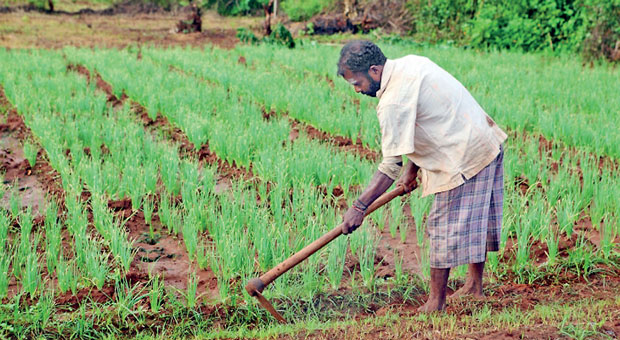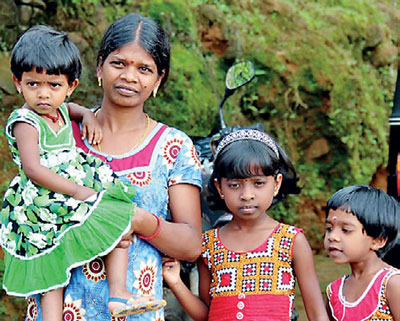04 May 2017 - {{hitsCtrl.values.hits}}

When Karuppiah Sellathurai bought his first cow, it only gave him a few litres of milk every day. But then he ‘multiplied’ his cattle when his cow had a calf. Several years down the line, he has four animals in his shed, milk to meet his family’s needs and more than enough left over
to sell.
The income is a welcome addition to the salary he earns from working in the tea estates of Hatton—the estate sector in Sri Lanka refers to large plantations growing tea, rubber or coconut that were established during the British colonial period.
Sellathurai uses the small rectangle of land behind his home to grow flowers and vegetables. Some of the latter find their way on to the family table, supplementing the family’s diet in a region where malnutrition remains distressingly common. Sellathurai’s son K. Vinodh makes a living as a taxi driver, but says his real ambition is to build on his father’s achievements. “We want to have a mini-farm,” Vinodh says.
The Sellathurai family is what experts would consider ‘positive deviants’. The term is used to describe certain individuals or families in a community whose uncommon but successful behaviours enable them to find better solutions to a problem compared to their peers.
Though they may experience the same constraints as their neighbours, positive deviants do something different. For example, local traditions may recommend a child sick with diarrhoea should not be fed. However, a positive deviant mother may go against this advice to keep her child nourished and hydrated, thereby ensuring his well-being.
In the case of the Sellathurai family, what makes them positive deviants is not just that they have their own home garden but that they actually incorporate its bounty into their diets.
A new report found that while 26 percent of estate households cultivate their home gardens, close to one-fifth do not consume their own produce and only about 12 percent consume it on a daily basis.
Identifying positive deviants like the Sellathurais in a community can offer researchers a glimpse of community-based, sustainable solutions to difficult issues like malnutrition.
A recently released nutrition assessment in Sri Lanka’s estate sector highlights some of these health-related issues and offers recommendations on how to move forward.
In Sri Lanka, undernutrition among mothers and children under five years of age remains a chronic development issue.
However, an analysis of national aggregates reveals stark inequalities. Researchers noted that districts with a high percentage of tea estates also had the highest rates of stunting among under-fives.
For example, in Nuwara Eliya the stunting rate in 2006-07 was 41 percent, as compared to the national average of 13.1. The report also notes that anaemia among pregnant women was widespread.
“Undernutrition is a behavioural and cultural problem as well as an economic one,” noted the authors of the study. They explored many underlying causes, collecting data on multiple aspects ranging from families’ socio-economic status to effectiveness of the government’s programmes to improve nutrition, such as dietary supplement Thriposha.
One of the key findings of the study is that there is significant space for improving health and nutrition service delivery for women both before and during pregnancy.
Only about half of women in the estate sector received advice on nutrition and family planning before they became pregnant. Although Thriposha is meant to be provided on a regular basis to all pregnant women, 18 percent did not receive it regularly and 10 percent never received it.
One way in which a positive deviant family diverges from their neighbours is in ensuring their pregnant family member has access to Thriposha and does not share her dose with others in the home. Other examples of positive deviance that researchers found included families where parents ignored traditional beliefs that eggs cause phlegm in children and regularly included this affordable, rich source of protein into their diets. Yet another example was when mothers were able to breastfeed their children within an hour of birth—the study found infants who were brought to their mother’s breast in that crucial time were less likely to be underweight, stunted or wasted.
These are practices worth promoting. As the Sri Lankan government and its development partners continue to invest money, time and effort in addressing the numerous health challenges faced by the estate community, positive deviant families offer crucial lessons in how to empower the community from within.
(Courtesy worldbank.org)
25 Nov 2024 45 minute ago
25 Nov 2024 1 hours ago
25 Nov 2024 1 hours ago
25 Nov 2024 2 hours ago
25 Nov 2024 3 hours ago